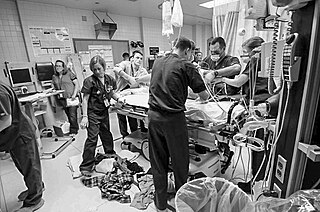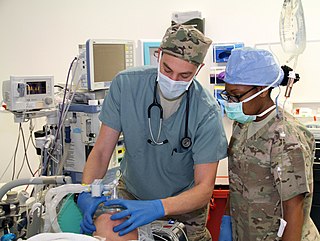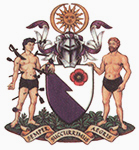
General surgery is a surgical specialty that focuses on alimentary canal and abdominal contents including the esophagus, stomach, small intestine, large intestine, liver, pancreas, gallbladder, appendix and bile ducts, and often the thyroid gland. They also deal with diseases involving the skin, breast, soft tissue, trauma, peripheral artery disease and hernias and perform endoscopic procedures such as gastroscopy and colonoscopy.

Emergency medicine is the medical speciality concerned with the care of illnesses or injuries requiring immediate medical attention. Emergency physicians continuously learn to care for unscheduled and undifferentiated patients of all ages. As first-line providers, in coordination with Emergency Medical Services, they are primarily responsible for initiating resuscitation and stabilization and performing the initial investigations and interventions necessary to diagnose and treat illnesses or injuries in the acute phase. Emergency physicians generally practise in hospital emergency departments, pre-hospital settings via emergency medical services, and intensive care units. Still, they may also work in primary care settings such as urgent care clinics.
In the medical profession, a general practitioner (GP) is a physician who treats acute and chronic illnesses and provides preventive care and health education to patients of all ages. GPs' duties are not confined to specific fields of medicine, and they have particular skills in treating people with multiple health issues. They are trained to treat patients to levels of complexity that vary between countries. The term "primary care physician" is more usually used in the US.
A podiatrist is a medical professional devoted to the treatment of disorders of the foot, ankle, and related structures of the leg. The term originated in North America but has now become the accepted term in the English-speaking world for all practitioners of podiatric medicine. The word chiropodist was previously used in the United States, but it is now regarded as antiquated.

Anesthesiology, anaesthesiology, or anaesthesia is the medical specialty concerned with the total perioperative care of patients before, during and after surgery. It encompasses anesthesia, intensive care medicine, critical emergency medicine, and pain medicine. A physician specialized in anesthesiology is called an anesthesiologist, anaesthesiologist, or anaesthetist, depending on the country. In some countries, the terms are synonymous, while in other countries they refer to different positions, and anesthetist is only used for non-physicians, such as nurse anesthetists.

Podiatry or podiatric medicine is a branch of medicine devoted to the study, diagnosis, medical and surgical treatment of disorders of the foot, ankle, and leg.
The Australian and New Zealand College of Anaesthetists (ANZCA) is responsible for examining and qualifying anaesthetists in Australia and New Zealand. The College maintains standards of practice in anaesthesia.
The Royal Australian and New Zealand College of Radiologists (RANZCR) is the leading professional organisation for the promotion of the science and practice of the medical specialties of clinical radiology and radiation oncology in Australia and New Zealand. The College has members throughout the world. RANZCR provides the educational curricula for medical graduates training to enter the specialties.
A medical specialty is a branch of medical practice that is focused on a defined group of patients, diseases, skills, or philosophy. Examples include those branches of medicine that deal exclusively with children (paediatrics), cancer (oncology), laboratory medicine (pathology), or primary care. After completing medical school or other basic training, physicians or surgeons and other clinicians usually further their medical education in a specific specialty of medicine by completing a multiple-year residency to become a specialist.

The Royal College of Emergency Medicine (RCEM) is an independent professional association of emergency physicians in the United Kingdom which sets standards of training and administers examinations for emergency medicine. The patron is The Princess Royal.

Medical education in Australia includes the educational activities involved in the initial and ongoing training of Medical Practitioners. In Australia, medical education begins in Medical School; upon graduation it is followed by a period of pre-vocational training including Internship and Residency; thereafter, enrolment into a specialist-vocational training program as a Registrar eventually leads to fellowship qualification and recognition as a fully qualified Specialist Medical Practitioner. Medical education in Australia is facilitated by Medical Schools and the Medical Specialty Colleges, and is regulated by the Australian Medical Council (AMC) and Australian Health Practitioner Regulation Agency (AHPRA) of which includes the Medical Board of Australia where medical practitioners are registered nationally.

The Royal Australian College of General Practitioners (RACGP) is the professional body for general practitioners (GPs) in Australia. The RACGP is responsible for maintaining standards for quality clinical practice, education and training, and research in Australian general practice. The RACGP represents over 40,000 members across metropolitan, urban, rural and remote Australia.

The Royal Australian and New Zealand College of Ophthalmologists (RANZCO) is the medical college responsible for training and professional development of ophthalmologists in Australia and New Zealand. The headquarters of the College is in Sydney, Australia.
Fellow of the Royal Australasian College of Physicians, abbreviated as the post-nominal initials FRACP, is a recognition of the completion of the prescribed postgraduate specialist training programme in internal adult or internal paediatric medicine of the Royal Australasian College of Physicians.
The Australian College of Rural and Remote Medicine (ACRRM) is one of the two Australian Medical Council (AMC) accredited general practice colleges in Australia. The College sets and upholds standards for best practice provision of rural and remote medical care. It provides training and certification, and professional development for rural general practice. It also provides advocacy and support for current and prospective rural doctors.
A phlebologist is a medical specialist in the diagnosis and treatment of disorders of venous origin. The specialty of phlebology has developed to enable physicians sharing an interest in venous disease and health to share knowledge and experience despite being trained in a variety of backgrounds such as dermatology, vascular surgery, haematology, interventional radiology or general medicine. Diagnostic techniques used include the patient's history and physical examination, venous imaging techniques in particular vascular ultrasound and laboratory evaluation related to venous thromboembolism. The American Medical Association and the American Osteopathic Association has added phlebology to their list of self-designated practice specialties.
The College of Intensive Care Medicine (CICM), also known by its longer and more complete name, the College of Intensive Care Medicine of Australia and New Zealand, is the medical specialty college statutorily responsible for the training and accreditation of intensive care medical specialists in Australia and New Zealand.
The Royal Australasian College of Medical Administrators (RACMA) is an accredited specialist medical college comprising medical practitioners with specialist training in management and leadership of health services and systems. Fellows of the college combine clinical knowledge, skill, and judgement and apply this at an organisation wide level. This may include administering or managing a hospital or other health service, or developing health operational policy, or planning or purchasing health services. The college is responsible for the training of medical professionals as specialist health leaders in Australia and New Zealand and has responsibility for assessing candidates and awarding the qualification of Fellowship of the college (FRACMA) to medical practitioners.
Overseas trained doctors in Australia (OTDs) are medical practitioners who completed their core medical training overseas. Historically, from time to time there has been a shortage of qualified medical practitioners in Australia, especially in rural Australia, and the Australian Government has at times encouraged immigration for such graduates to Australia.

The Australasian College of Sport and Exercise Physicians (ACSEP) is a not-for-profit professional organisation responsible for training, educating, and representing over 350 doctors in Australia and New Zealand. These doctors practise medicine in the specialty of sport and exercise medicine (SEM). The ACSEP is the smallest of the 15 recognised specialist medical Colleges in Australia with approximately 260 Fellows and Registrars in 2020.









